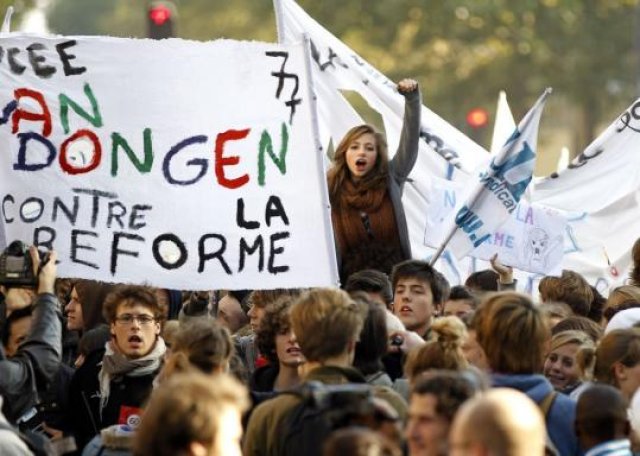
Workers and students mobilised in their millions on October 12 in the fourth and largest day of action in the past month against laws that will reduce workers’ pension entitlements.
The protests and strikes came as the Senate passed aspects of the pension bill that will see an increase in the retirement age from 60 to 62 years of age and increase the period of time workers must work to receive a full pension.
The protests show growing polarisation over who should pay the price for the economic crisis in the lead up to national strikes on October 16 and 19.
As with previous protests, the protests’ size has been heavily contested. The government has tried to downplay the level of public support, while unions said the protests reflect deep public anger.
Unions estimated 3.5 million people took part in 244 protests across France, an increase on the 3 million people estimated to have joined the September 23 and October 2 days of action.
The interior ministry, however, claimed only 1.23 million people took part in the protests.
Unions said the growth mainly came from private sector workers and students.
The General Confederation of Workers (CGT) said much larger numbers of private sector workers took part in the strike, including non-union members, than previous ones. One of the most significant developments took place in the oil industry, with strikes at 11 of France’s 12 oil refineries.
There was also a large increase in the number of university and high school students taking part, with tens of thousands joining protests. At least 400 schools were closed due to staff and student action.
The media has made much of the entry of students into the movement, raising the spectre of the mass protests in May-June 1968 that shook France.
Adding to the threat of student protests was the decision of union members in industries such as oil, rail, ports and some public services to start indefinite strike action. The strike by oil workers poses a real possibility of substantial fuel shortages.
The CGT and radical union confederation Solidaires are calling for the strike movement to spread. However, other confederations have raised concerns that intensifying the movement risked alienating the broader public and providing President Nicolas Sarkozy with a chance to rebuild his flagging electoral fortunes through a shattering defeat of the union struggle.
French Confederation of Christian Workers (CFTC) has opposed indefinite strikes and said its members in the rail system would not join any.
The BBC reported on October 12 that French Democratic Confederation of Labour (CFDT) secretary-general Francois Chereque said: “The large majority of employees cannot afford to pay for repeated days of strikes.”
However, Solidaires argued: “A few days of strikes to not lose years of free time is worth it, right? The strike will cost money … But the implementation of this bill will cost more!”
The Senate approved the rise in the minimum retirement age from 60 to 62 on October 8. Failure by the movement to life the intensity of the struggle will likely cause the government to grow more confident in its ability to ride the protest and strike wave out.
However, with 67% public support for an intensified industrial campaign, and the momentum built since the campaign’s start in April, the unions are in a strong position to escalate the movement.
An October 12 Solidaires statement said: “There is no time to lose: now is the time to harden and expand the movement to win.”
The media’s immediate focus is on the outcome of the government’s attempt to wind back France’s welfare state, but there is far more at stake.
The determination of the government to cut pensions so soon after it provided huge bailouts to the banks and business to help them recover from the global financial crisis risks sparking a far deeper radicalisation.
If the unions and social movements defeat the pension bill, it could be the signal for them to begin an offensive against the government’s pro-capitalist policies.
The inter-union coalition, which has led campaign, met on October 14 to plan further actions. The response to the October 16 and 19 strike calls, in the wake of the big October 12 mobilisations and the start of some indefinite strikes, will be important tests for the movement.
[A longer version of this article can be read at Chris Latham’s blog, RevitalisatingLabour.blogspot.com, which has regular updates on the French labour movement.]
